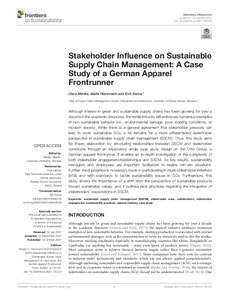| dc.date.accessioned | 2021-11-02T15:26:46Z | |
| dc.date.available | 2021-11-02T15:26:46Z | |
| dc.date.issued | 2021-10-12 | |
| dc.identifier | doi:10.17170/kobra-202110284987 | |
| dc.identifier.uri | http://hdl.handle.net/123456789/13351 | |
| dc.description.sponsorship | Gefördert durch den Publikationsfonds der Universität Kassel | ger |
| dc.language.iso | eng | eng |
| dc.rights | Namensnennung 4.0 International | * |
| dc.rights.uri | http://creativecommons.org/licenses/by/4.0/ | * |
| dc.subject | sustainable supply chain management (SSCM) | eng |
| dc.subject | stakeholder roles | eng |
| dc.subject | collaboration | eng |
| dc.subject | stakeholder engagement | eng |
| dc.subject | sustainability practices | eng |
| dc.subject | apparel industry | eng |
| dc.subject | case study | eng |
| dc.subject.ddc | 330 | |
| dc.title | Stakeholder Influence on Sustainable Supply Chain Management: A Case Study of a German Apparel Frontrunner | eng |
| dc.type | Aufsatz | |
| dcterms.abstract | Although interest in green and sustainable supply chains has been growing for over a decade in the academic discourse, the textile industry still embraces numerous examples of non-sustainable behavior (i.e., environmental damage, poor working conditions, or modern slavery). While there is a general agreement that stakeholder pressure can lead to more sustainable SCs, a lot remains for a more differentiated stakeholder perspective in sustainable supply chain management (SSCM). Thus, this study aims for theory elaboration by structuring relationships between SSCM and stakeholder constructs through an exploratory single case study design on the Otto Group, a German apparel frontrunner. It enables an in-depth investigation of the complexity of both stakeholder engagement/relationships and SSCM. As key results, sustainability managers and employees are important facilitators to realize win-win situations. Further, most progress is nowadays made in participating in multi-stakeholder-initiatives (MSI) and with standards to tackle sustainability issues in SCs. Furthermore, this study shows the importance of a shift from the perspective of sustainable products toward sustainable values, and it outlines best practices regarding the integration of stakeholders' expectations in SSCM. | eng |
| dcterms.accessRights | open access | |
| dcterms.creator | Menke, Clara | |
| dcterms.creator | Hüsemann, Malte | |
| dcterms.creator | Siems, Erik | |
| dc.relation.doi | doi:10.3389/frsus.2021.735123 | |
| dc.subject.swd | Nachhaltigkeit | ger |
| dc.subject.swd | Supply Chain Management | ger |
| dc.subject.swd | Stakeholder | ger |
| dc.subject.swd | Kooperation | ger |
| dc.subject.swd | Engagement | ger |
| dc.subject.swd | Bekleidungsindustrie | ger |
| dc.subject.swd | Otto Group | ger |
| dc.subject.swd | Fallstudie | ger |
| dc.type.version | publishedVersion | |
| dcterms.source.identifier | eissn:2673-4524 | |
| dcterms.source.journal | Frontiers in sustainability | eng |
| dcterms.source.volume | Volume 2 | |
| kup.iskup | false | |
| dcterms.source.articlenumber | 735123 | |


